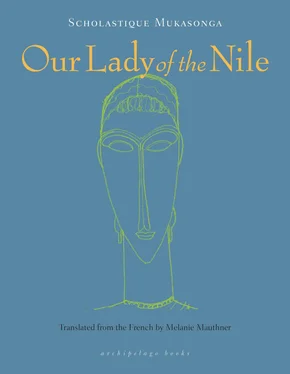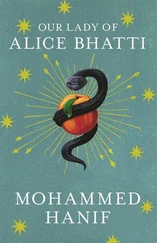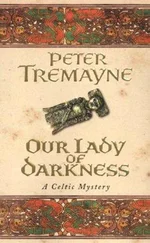In the dream, she was sometimes in her own bed, but more often in class. She began to bleed, a huge red patch soaking into her blue dress, sticky blood between her thighs, and down her legs, a long stream flowing under her seat and beneath the other desks. The pupils started screaming: “It’s her again, she’s bleeding, she’s bleeding … It’ll never end!” And the teacher shouted: “We must take her to Sister Gerda. She knows what to do with girls who bleed anywhere and everywhere.” And suddenly she found herself in Sister Gerda’s office, with an angry Sister Gerda shouting at her: “Look at that! It’s what I’ve always said: that’s what it means to be a woman. And you all want to become women. It’s your own fault! And now there’s all that blood. It’s never ending!”
Modesta didn’t like to remember. And yet the same memory kept flooding back. It was no longer a dream, more a memory she kept reliving, like a sin she’d never be able to atone for. It began the year she started middle school. She had passed the national exam and was therefore able to join the core curriculum. She felt proud. Her parents felt proud. The neighbors felt proud, and jealous. She felt proud that her neighbors felt jealous because of her. They went to the tailor’s to have her uniform made; they purchased exercise books and pens from the Saint-Michel Économat; from a Pakistani shop in Muhima, they bought material to make two sheets. The list also specified two meters of white fabric, the type known as americani . She had no idea what that could be for. Neither did her father. She didn’t ask her mother, who knew nothing about school stuff. She hadn’t dared ask the parish priest. They put everything into the suitcase they’d bought specially for her, since her big sister’s case was too battered. She needed a new case to make a good impression, for the sake of her family’s honor. When they got to school, the sister monitor checked the contents. It was all there, including the americani material, which the sister appeared to consider especially important: “You’re to bring it along to the first sewing lesson,” she told her.
The sixth-grade class soon split into two cliques: those with breasts, and those without. Those with breasts began to scorn those without. They chatted a lot with the older girls, all of whom had breasts. It was as if they had secrets to share. Modesta was one of those without breasts. Yet she had two little nipples, budding breasts, that gave some contour to her chest. But for reasons Modesta couldn’t fathom, the older girls hadn’t wanted her to join their faction.
In the first sewing class, two days after the start of the school year, the teacher checked they all had their americani . Modesta showed her length of fabric, along with the other girls. “We’re going to make strips,” she said, “that’s our very first task. Everyone must have finished by the end of class.” The teacher handed out scissors and patterns, and the pupils cut the material into long strips, and then each strip into twenty sections. “Now, fold the twenty pieces in four, then sew the edges. Each piece should look like a little mattress.” Next, she had them make a string-drawn bag, into which they put the twenty strips. “Those who don’t need them yet, pack them carefully in your suitcase for now.”
But there were many more mysteries. In the garden, behind a bamboo grove, stood a small brick house surrounded by a low wall. “That’s the purdah house,” said the older ones, laughing, “and you breastless young girls have no business there; don’t you even come close.” But for the Sisters, it was no laughing matter. There was always one of them keeping watch on the forbidden house, chasing away any servants or gardeners who approached it, and handing out severe punishments to the younger girls who hung around nearby out of curiosity. This sentry duty was mostly performed by Sister Gerda, the Keeper of the Mystery. She became quite fierce if she caught any of the little ones trying to follow any Initiates of the Mysteries as they walked toward the forbidden place carrying a bucket. But deep down, the girls without breasts knew very well that all these mysteries — the americani strips, the “dirty den,” the bucket — would soon be revealed to them. They knew their turn would come.
Initiation: the fear, the shame. For Modesta, it happened in class. During English. She felt a warm liquid running down her legs, and when she stood up, her classmates in the row behind saw a large red stain spreading across her dress, and blood dripping onto the cement floor. “Madame!” cried the girl sitting next to Modesta, as she pointed at her. The teacher saw the puddle of blood. “Quick,” she said, “Immaculée, take her to Sister Gerda.” Modesta followed Immaculée, weeping floods of tears. “Don’t cry,” said Immaculée, “it happens to every girl. Surely you didn’t expect to escape it. You’re a real woman now. You’ll have children.” Immaculée knocked at the door of Sister Gerda’s office. “Well, well,” said Sister Gerda, “here’s Modesta, I wasn’t expecting it so soon. So, we’re a young woman now. You’ll see how much you have to suffer for that: it’s God’s will, payment for Eve’s sin; Eve, who opened the door to the devil; Eve, the mother of us all. Women are made to suffer. Modesta, what a beautiful name for a woman, for a Christian woman. From now on, every month, this blood will remind you that you’re only a woman, and if ever you float off thinking you’re beautiful, it will be there to remind you of what you are: just a woman.”
After Modesta took a shower, Sister Gerda initiated her into the Mysteries of a woman’s cycles. She showed her how to use the strips she now called “sanitary pads.” She told her to go to the school shop and buy a little bucket with a lid in which to put the used pads, as well as a slab of household soap. There’d be no need to explain why to Sister Bernadette behind the counter.
Sister Gerda asked for the key to the dormitory, which remained shut all day, opened the doors wide so that Modesta could get a pad from the bag, and then took Modesta to the little brick house. As soon as she opened the door, the acrid, fetid stench made Modesta step back. “Go on in,” said Sister Gerda, “You can’t go back now, it’s too late to pretend you’re still a girl.” Inside the shadowy room, lit only by a narrow wire-mesh window, Modesta saw washing lines stretched from one wall to another, from which dangled sanitary pads in shades of pink, gray, purplish-blue, and dirty white, that the boarders had hung out to dry. “At the back,” said Sister Gerda, “there’s a tub for you to wash your dirty pads. You’ll scrub and you’ll scrub, but you’ll never scrub hard enough to erase the sin of being a woman. And believe me, I could tell you the owner of each and every pad, those who scrub and those who don’t. You can spot the lazy ones immediately: their pads remain steeped in their menstrual secretions. Shame on them! So make sure you scrub, Modesta, to avoid piling shame upon shame.”
Modesta liked to confide in Virginia, sharing her secrets in private, well away from prying eyes, especially those of Gloriosa. Yes, a Hutu girl could be friends with a Tutsi girl. It didn’t impose any future obligations upon them. Whenever it would finally prove necessary for the majority people to become the majority for good, Hutu girls would know full well which race they belonged to. Because there were two races in Rwanda. Or three. The whites had said so; they were the ones who had discovered it. They’d written about it in their books. Experts came from miles around and measured all the skulls. Their conclusions were irrefutable. Two races: Hutu and Tutsi, also known as Bantu and Hamite. The third race wasn’t even worth mentioning. But Modesta wasn’t fully Hutu. Of course she was considered Hutu because her father was. And it’s the father who matters. But because of her mother, you could say that she was only half Hutu — and indeed many did say that. It was dangerous for her to be seen hanging around with a Tutsi girl. People would immediately ask her: “So, which side are you on? Do you really know who you are? You must be a traitor, a spy for those inyenzi — cockroaches. You pass yourself off as a Hutu, but really you gravitate toward the Tutsi whenever you can, because you consider them your real family.’
Читать дальше












